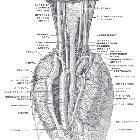bronchial artery



The bronchial arteries are the major supply of high-pressure oxygenated blood to the supporting structures of the lung, including the pulmonary arteries, yet they are responsible for only 1% of the lung blood flow overall.
Bronchial artery anatomy is variable, most commonly classified according to Cauldwell classification. A classic pattern of two left and a one right main bronchial arteries is found in ~70% of patients.
Summary
- location: posterior mediastinum, in close association with aorta and bronchi
- origin and termination: thoracic aorta (left); common intercostobronchial trunk (right); terminates at capillary plexi of respiratory bronchioles
- branches and supply: variable
- relations: frequently
Gross anatomy
The bronchial arteries arise from their parent vessels at the T3-T8 levels, most commonly between T5-T6 level (~70%; range 64-80%) where it is termed an orthopic origin . There are most commonly 3 main bronchial arteries, one right and two left. In addition, there are often additional smaller bronchial arteries arising from the descending thoracic aorta .
They are small caliber arteries, with a diameter of 1.5 mm at the origin, tapering down to approximately 0.5 mm at the pulmonary hila level .
The main bronchial arteries course into the pulmonary hila, branching down to the level of the respiratory bronchioles . Proximally, the left bronchial artery passes to the left of the esophagus, while the right bronchial artery may pass to the right or left of the esophagus . Their small branches form a network of arteries running along the external bronchial surface, with penetrating branches to supply the submucosal arterial network and sometimes a subpleural pulmonary capillary plexus .
Left bronchial arteries
There are usually two left bronchial arteries that arise directly from the anteromedial thoracic aorta :
- superior left bronchial artery: arises from the aorta near the level of the aortic arch, lateral to the carina, and posterior to the left main bronchus
- inferior left bronchial artery: arises from the aorta parallel to the superior artery, but inferior to the left main bronchus
Right bronchial artery
The right bronchial artery has a common origin with a posterior intercostal artery called the intercostobronchial trunk (ICBT), and arises from the right anteromedial aspect of the thoracic aorta .
Supply
- trachea and bronchi
- lymph nodes
- visceral pleura (jointly with pulmonary arterial supply )
- pericardium
- esophagus (middle-third)
- posterior mediastinum
- vagus nerve
- vaso vasorum of the aorta, pulmonary trunk and pulmonary vein
Variant anatomy
Origin
Ectopic origin is present in ~20% (range 8.3-35%) of patients and is defined when they arise from the aorta outside of the level from superior endplate of T5 to inferior endplate of T6 .
The bronchial arteries may arise from a wide range of arteries including :
Ostium
Although most commonly arising from the anteromedial aspect of the descending aorta (superomedial aspect aortic arch), the origin may also be located at :
- anterolateral aorta
- posteromedial aorta
- posterolateral aorta (rare)
Branching patterns
- common bronchial artery trunk (i.e. for both left and right bronchial arteries)
- single bronchial artery bilaterally (i.e. one left and one right)
- single bronchial artery on the left and two bronchial arteries on the right (one ICBT)
- left bronchial artery less commonly has its origin from an ICBT
Related pathology
Siehe auch:
und weiter:

 Assoziationen und Differentialdiagnosen zu Bronchialarterie:
Assoziationen und Differentialdiagnosen zu Bronchialarterie:
